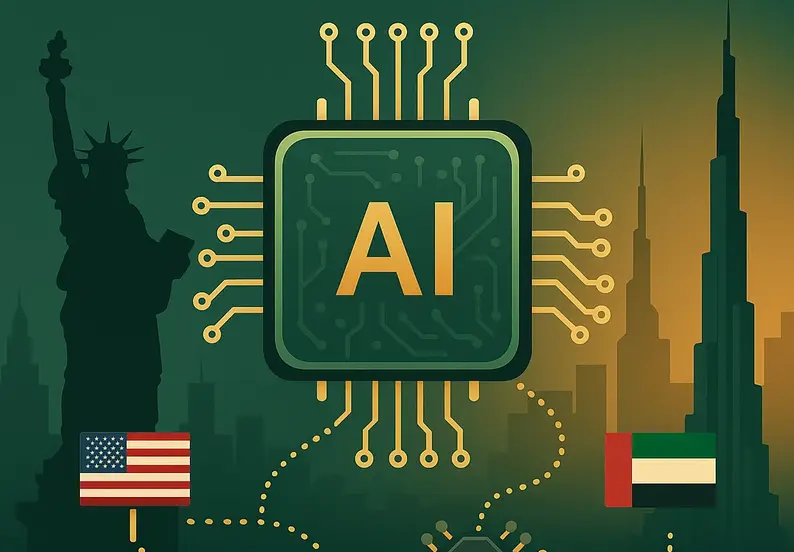Nvidia chip sales UAE represents a revolutionary breakthrough in US AI statecraft and Middle East technology partnerships. The US government’s approval of high-end Nvidia AI chip exports to the United Arab Emirates marks a significant moment in international technology trade and strategic positioning in the global AI race.
This approval comes after months of intense debate within the US administration about whether countries like the UAE should receive access to the most advanced AI chips. The decision to allow these exports on a large scale represents a major shift in US technology export policy and signals a new era of strategic AI partnerships.
What Makes Nvidia Chip Sales UAE Different from Previous Tech Exports
The UAE has positioned itself as a major player in the global AI landscape, investing heavily to become both an AI hub and a data center hub. This strategic positioning makes access to advanced Nvidia chips not just a commercial transaction but a critical component of the UAE’s national development strategy.
The approval represents one of the first major instances of the US allowing the export of high-end AI chips to Middle Eastern countries, marking a significant shift in technology export policy and international AI cooperation.
The Strategic Importance of AI Chip Access
High-end chips are essential for training and running the most sophisticated AI models, making them a critical resource for any country seeking to establish itself as a leader in artificial intelligence. The UAE’s access to these chips positions it to compete effectively in the global AI market.
The strategic value of these chips extends beyond commercial applications to include national security considerations, as AI technology becomes increasingly important for defense, intelligence, and critical infrastructure protection.
US-UAE Technology Partnership and Economic Ties
The Nvidia chip sales UAE approval fits into a broader pattern of strengthening US-UAE economic and technological cooperation. Earlier this year, the two countries announced massive sets of deals worth billions of dollars, with the UAE committing to import significant quantities of advanced technology.
This partnership represents a key pillar of the UAE’s Vision 2030, which aims to diversify the country’s economy and establish it as a global technology leader. The access to advanced AI chips is essential for achieving these ambitious goals.
The economic impact of these deals extends beyond the immediate chip sales to include long-term investments in data centers, AI research facilities, and technology infrastructure that will benefit both countries.
Building the Future of Tech
The US–UAE technology partnership highlights massive opportunities in AI, data centers, and advanced infrastructure. Employers can get ahead of this global shift by hiring top talent ready to drive innovation and long-term growth. Post your job on WhatJobs today and connect with professionals eager to shape the future of technology and international collaboration.
Post a Job Free for 30 Days →Countering Chinese Influence in the Middle East
This strategic approach helps the US maintain its technological leadership while building stronger partnerships with countries that share similar values and interests. The UAE’s access to advanced AI technology reduces its dependence on Chinese alternatives and strengthens its alignment with US technology standards.
The approval also demonstrates the US’s commitment to supporting its allies’ technological development, even when it involves sharing sensitive and advanced technology.
The Role of Trump’s Middle East Policy
Trump’s first-term policies and his stated intentions for a potential second term emphasize closer business relationships with countries like the UAE, Qatar, and Saudi Arabia. The technology partnerships, including the Nvidia chip sales, represent a key component of this strategy.
The approval of these chip sales demonstrates the continuity of US policy toward the Middle East and the importance of technology cooperation in maintaining strong international relationships.
Divisions Within the US Administration
The Nvidia chip sales UAE approval came after significant debate within the US administration, with not everyone in the White House believing that countries like the UAE should receive access to such advanced technology. These divisions reflect the complex nature of technology export decisions and the competing interests involved.
The fact that the approval was granted despite these internal disagreements suggests that the strategic benefits of the deal were deemed to outweigh the potential risks. This decision-making process highlights the careful balance that must be struck between technology security and international cooperation.
The approval also demonstrates the administration’s willingness to make difficult decisions in the interest of broader strategic goals, even when there are legitimate concerns about technology transfer.
The Future of US AI Statecraft
The Nvidia chip sales UAE approval represents a significant moment in US AI statecraft and sets a precedent for future technology export decisions. This approval demonstrates the US’s willingness to share advanced technology with trusted partners while maintaining appropriate safeguards.
The success of this deal may encourage other countries to seek similar technology partnerships with the US, potentially expanding the global network of AI cooperation and development. This could lead to a more interconnected and collaborative approach to AI development worldwide.
The approval also signals the US’s recognition that maintaining technological leadership requires not just developing advanced technology but also sharing it strategically with key partners.
Frequently Asked Questions
What does Nvidia chip sales UAE approval mean for US technology exports and AI statecraft?
Nvidia chip sales UAE approval represents a breakthrough in US AI statecraft, allowing billions of dollars in high-end AI chip exports to the UAE, marking a significant shift in technology export policy and strengthening US-Middle East partnerships in artificial intelligence.
How does Nvidia chip sales UAE differ from previous technology export agreements?
Nvidia chip sales UAE differs from previous tech exports by involving the highest-end AI chips on an unprecedented scale, representing strategic technology transfer rather than routine commercial sales, and serving as a key component of the UAE’s national AI development strategy.
What are the strategic implications of Nvidia chip sales UAE for US foreign policy?
Nvidia chip sales UAE strengthens US-Middle East partnerships, counters Chinese influence in the region, supports the UAE’s AI hub ambitions, and demonstrates US commitment to sharing advanced technology with trusted allies while maintaining appropriate safeguards.
How does Nvidia chip sales UAE fit into broader US technology and economic strategy?
Nvidia chip sales UAE fits into broader US strategy by strengthening economic ties with Gulf states, supporting regional AI development, countering Chinese technological influence, and aligning with Trump’s Middle East policy of forging closer business relationships with key regional partners.
A Real-World Example: Ahmed’s AI Development Journey
Ahmed Al-Rashid, a 28-year-old AI researcher from Dubai, exemplifies how Nvidia chip sales UAE can transform technological development and innovation. After years of working with limited computational resources, Ahmed was looking for access to advanced AI hardware to accelerate his research projects.
“I had been working on AI models for years, but I was constantly hitting computational limitations that prevented me from exploring more sophisticated architectures,” Ahmed explains. “When I heard about the Nvidia chip sales UAE approval, I was immediately excited because it promised to provide the computational foundation needed for breakthrough AI research.”
Ahmed’s journey with the new technology access began when he gained access to the advanced Nvidia chips through his research institution. He was particularly attracted to the chips’ ability to handle massive parallel processing requirements for complex AI models and their potential to accelerate his research significantly.
“The computational power was incredible,” Ahmed says. “I could finally train models that I had only dreamed about before. The Nvidia chip sales UAE deal gave me access to technology that was previously only available to researchers in the US and Europe.”
Within six months of gaining access to the advanced chips, Ahmed had developed several breakthrough AI models that significantly advanced his research field. He was able to process datasets that were previously too large for his computational resources and explore new AI architectures that required massive parallel processing capabilities.
“Nvidia chip sales UAE gave me access to technology that I previously thought was only available to the largest tech companies,” Ahmed reflects. “The approval showed me that the UAE’s vision of becoming a global AI hub is not just aspirational but achievable with the right technology and partnerships.”




